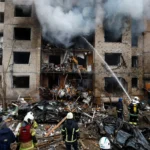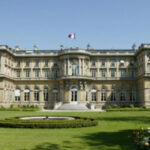There are the tunnels of war and terror, those used to hide soldiers, militias and hostages. There are also the tunnels created to unite people of different faiths in friendship. In Jakarta, the Istiqlal Mosque, the largest in Southeast Asia, and the Catholic Cathedral of Our Lady of the Assumption face each other, close to each other but separated by a three-lane road. An old subway line has been restored, decorated with works of art and transformed into a “tunnel of brotherhood” to connect the place where Muslims pray to the place where Christians celebrate the Eucharist. In a world in flames in which mediatized and forgotten wars take place, where violence and hatred seem to prevail, we must find paths of friendship, bet on dialogue and peace because we are “Fratelli tutti” (All brothers). This is what the Successor of Peter, the builder of bridges, testifies to.
Today, Francis is flying to Asia and Oceania, for the longest journey of his pontificate: from Indonesia – the largest Muslim country in the world – to Papua New Guinea, then to East Timor and finally to Singapore. A pilgrimage to be close to Christians, where they are a “small flock”, as in Indonesia, or where they represent almost the entire population, as in East Timor. A journey to meet everyone and reaffirm that we are not condemned to walls, barriers, hatred and violence, because women and men of different faiths, ethnicities and cultures can live together, respect each other, collaborate.
Although planned four years ago and postponed due to the pandemic, the visit to Asia and Oceania now takes on a prophetic significance. The Bishop of Rome, like the saint of Assisi whose name he bears, presents himself unarmed, with no intention of conquest or proselytism, wishing only to bear witness to the beauty of the Gospel by going to Vanimo, a town of nine thousand souls overlooking the Pacific Ocean. This was what had driven his predecessor Paul VI, who on November 29, 1970, aboard a small plane, had reached Apia, in independent Samoa, to celebrate Mass behind a small rickety altar in Leulumoega for a few hundred islanders.
This is what prompted John Paul II to visit this region of the world several times and what made him say, on November 20, 1986 in Singapore, about the “true essence” of Jesus’ teaching: “Love responds generously to the needs of the poor and is filled with pity for those who suffer. Love is ready to offer hospitality and is faithful in times of difficulty. It is always ready to forgive, to hope and to return blasphemy with a blessing. ‘Love will never pass away’ (1 Cor 13:8). The commandment of love is at the heart of the Gospel.”
This article is originally published on vaticannews.va








